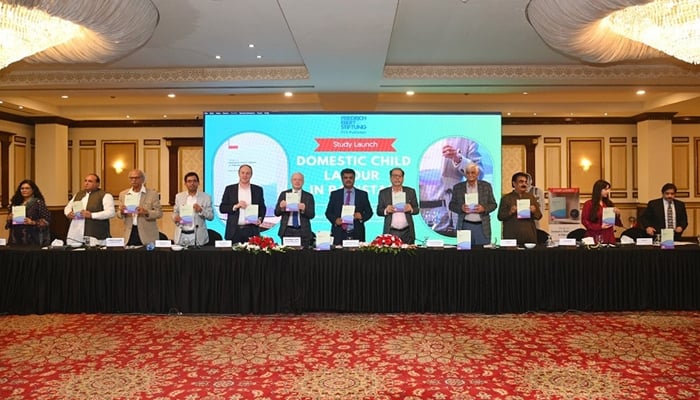Labour laws implementation difficult as dept operating at half of its capacity: secy
The Friedrich-Ebert-Stiftung (FES) Pakistan in collaboration with Sindh Human Rights Commission (SHRC) launched on Sunday a study on ‘Domestic Child Labour in Pakistan’ authored by SHRC Chairperson Iqbal Detho.
The study comprises of legal and administrative gaps in implementation of child rights laws. The programme was moderated by FES Pakistan’s representative Abdullah Dayo.
He said that the study report will also be translated in Urdu language for better audience reach and awareness.
Germany’s consul general in Karachi, Dr Rudiger Lotz, shed light on the detrimental impact of labour in children’s development, which compromised on their dignity and childhood essentials. He lauded the efforts of government bodies and German political foundation FES for their advocacy on child rights.
Detho highlighted the cases of child abuses in the country, including that of Farzana from Islamabad and Fatima Fariro from Ranipur, and examined them within the international, national and provincial legal frameworks. He asserted on the gravity of bonded labour and termed it a heinous offense, while discussing the Sindh Bonded Labour Act of 2016. He also touched upon the Labor Force Survey and Section 374 (unlawful compulsory labour) of the Pakistan Penal Code.
Sindh secretary for labour, Shariq Ahmed, spoke about the challenges in implementing the laws, because the labour department was operating at half of its required capacity.
Senator Taj Haider highlighted that many laws in Pakistan were not in accordance with the international conventions the country had signed. He stressed on the need for the state’s intervention in understanding why children were not attending school, suggesting that the authorities should engage with parents to address this issue.
Barrister Rida Tahir highlighted the legal gaps regarding child domestic labour. Referring to an International Labour Organization’s (ILO) report, she said the data indicated that women and girls were often hired under the pretext of being skilled babysitters.
ILO representative Saghir Bukhari noted an increase in child labour after the Covid-19 pandemic and stressed on creating awareness among parents about the issue. Trade unionist and political activist Habibuddin Junaidi appreciated the efforts made by the SHRC.
FES Pakistan country director, Dr Niels Hegewisch, thanked the participants and pledged for more collaborative efforts with government and civil society to highlight challenges and advocate for necessary changes in policies and implementations to tackle domestic child labour in Pakistan.
In his concluding remarks Sindh caretaker minister of information, minority affairs and social protection, Ahmad Shah, said that the government was committed to strictly implement the labour and trade union laws in the province. He said that the Pakistani civil society and every educated person had to play their role in discouraging and ending the menace of child labour in the country.
Shah said the Sindh government had taken the lead in passing the legislation to protect the rights of the downtrodden sections of the society in a bid to help them. In response to a question, the minister said that funds had been released by the government for the repair of all the government school buildings that were destroyed during the recent floods in the province.
-
 Northern Lights: Calm Conditions Persist Amid Low Space Weather Activity
Northern Lights: Calm Conditions Persist Amid Low Space Weather Activity -
 'Look What Andrew Has Done': Meghan Markle Defended On Jeremy Vine Show
'Look What Andrew Has Done': Meghan Markle Defended On Jeremy Vine Show -
 Apple, Google Agree To Make 'app Store' Changes Over UK Regulator Concerns
Apple, Google Agree To Make 'app Store' Changes Over UK Regulator Concerns -
 Autodesk Files Lawsuit Against Google Over AI Video Tool Trademark Dispute
Autodesk Files Lawsuit Against Google Over AI Video Tool Trademark Dispute -
 San Francisco 49ers Player Shot Near Post-Super Bowl Party
San Francisco 49ers Player Shot Near Post-Super Bowl Party -
 Kardashian-Jenner Clan Brings Lewis Hamilton Into The Fold: Watch
Kardashian-Jenner Clan Brings Lewis Hamilton Into The Fold: Watch -
 Meghan Markle 'quietly Dreaded' As Ex-best Friend Receives Lucrative Offer For Bombshell Memoir About Duchess
Meghan Markle 'quietly Dreaded' As Ex-best Friend Receives Lucrative Offer For Bombshell Memoir About Duchess -
 Blake Shelton, Gwen Stefani Make Big Move To Save Their Marriage
Blake Shelton, Gwen Stefani Make Big Move To Save Their Marriage -
 Google Warns Of State-sponsored Cyberattacks Targeting Defense Sector Employees
Google Warns Of State-sponsored Cyberattacks Targeting Defense Sector Employees -
 Ransom Deadline Passes: FBI Confirms ‘communication Blackout’ In Nancy Guthrie Abduction
Ransom Deadline Passes: FBI Confirms ‘communication Blackout’ In Nancy Guthrie Abduction -
 Jeff Bezos Hints At Blue Origin Moon Plans As Elon Musk Responds With Cautious Praise
Jeff Bezos Hints At Blue Origin Moon Plans As Elon Musk Responds With Cautious Praise -
 Zach Bryan Slams Turning Point USA Alternative Halftime Show: 'Embarrassing As Hell'
Zach Bryan Slams Turning Point USA Alternative Halftime Show: 'Embarrassing As Hell' -
 South Korea Blames Coupang Data Breach On 'management Failures,' Not Cyber Attack
South Korea Blames Coupang Data Breach On 'management Failures,' Not Cyber Attack -
 ‘Disgraced’ Andrew More Concerned About ‘issue Of His Legacy’ Than Epstein Links
‘Disgraced’ Andrew More Concerned About ‘issue Of His Legacy’ Than Epstein Links -
 Instagram Plans New Snapchat-style App ‘Instants’ Amid Rising AR Competition
Instagram Plans New Snapchat-style App ‘Instants’ Amid Rising AR Competition -
 Safer Internet Day 2026: Is Social Media Ban The Only Way To Protect Kids?
Safer Internet Day 2026: Is Social Media Ban The Only Way To Protect Kids?




